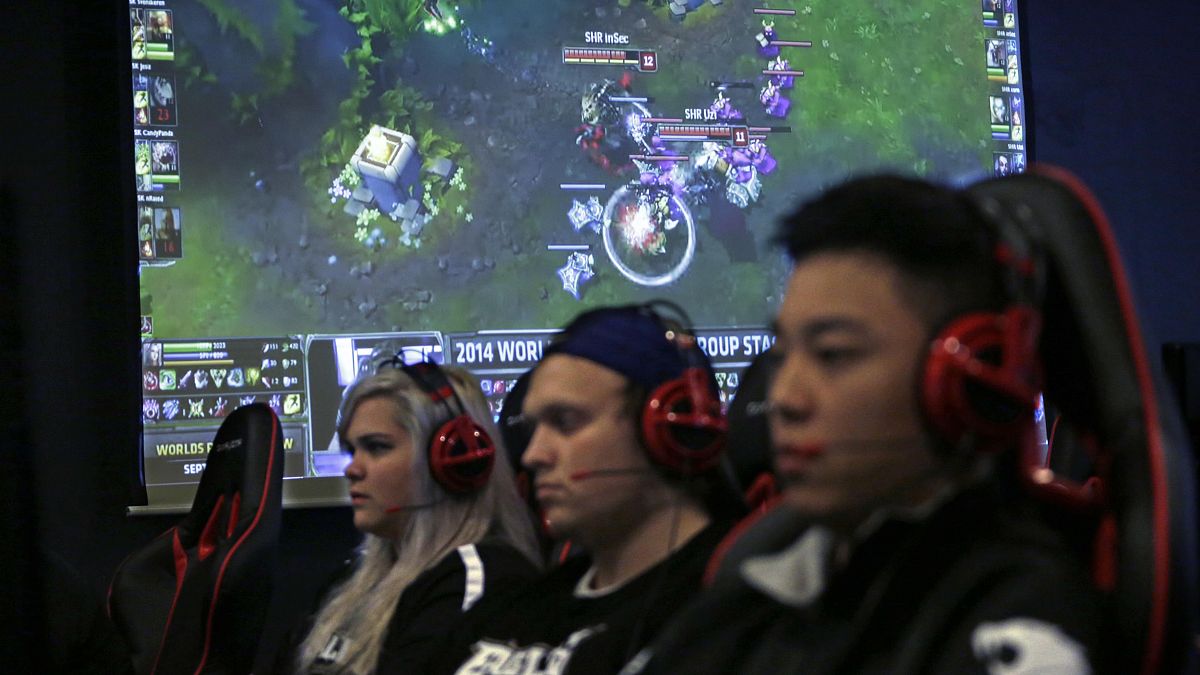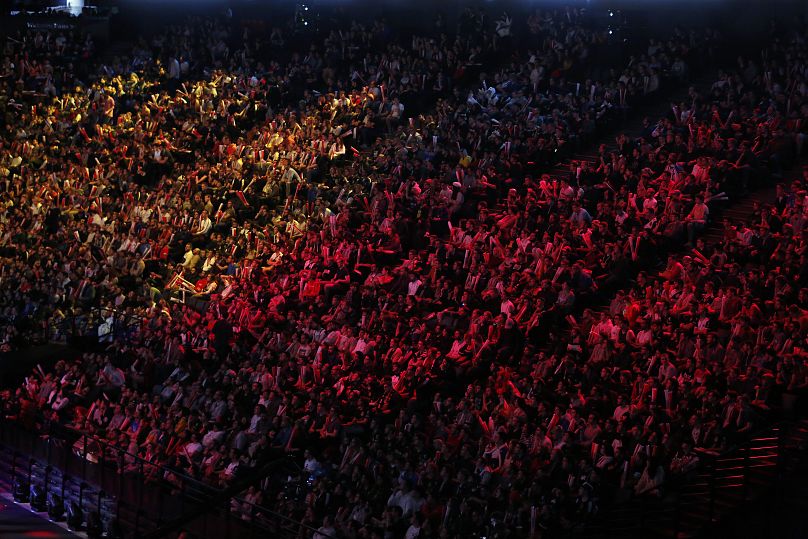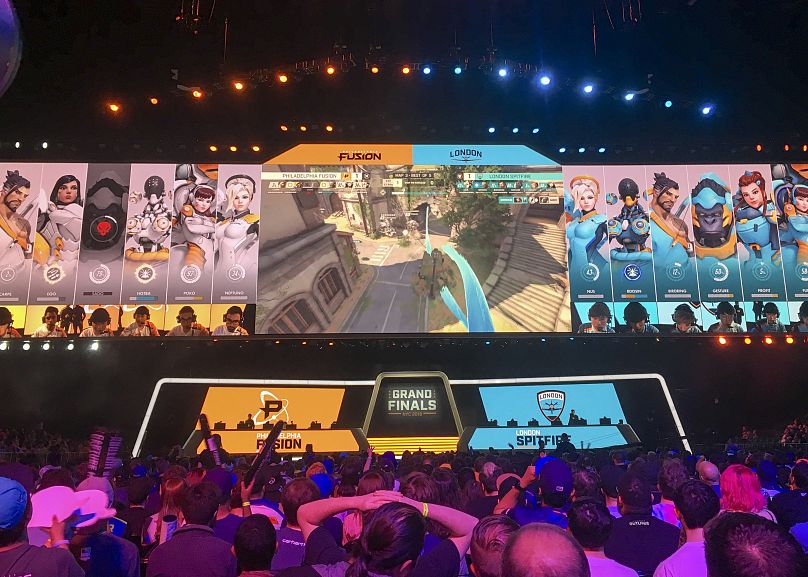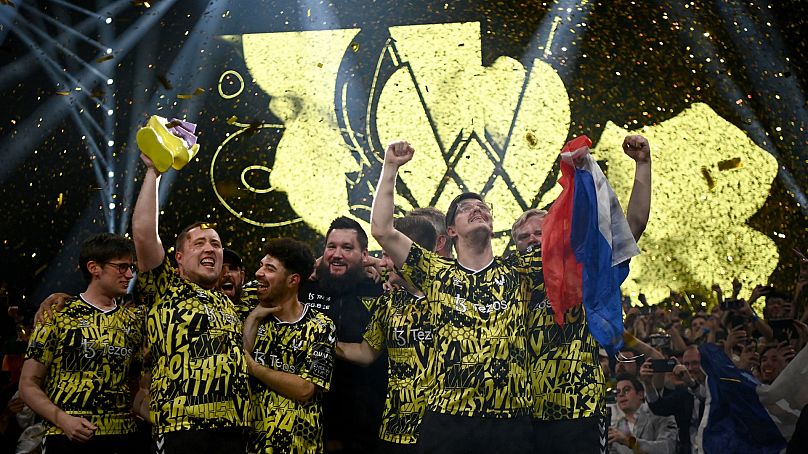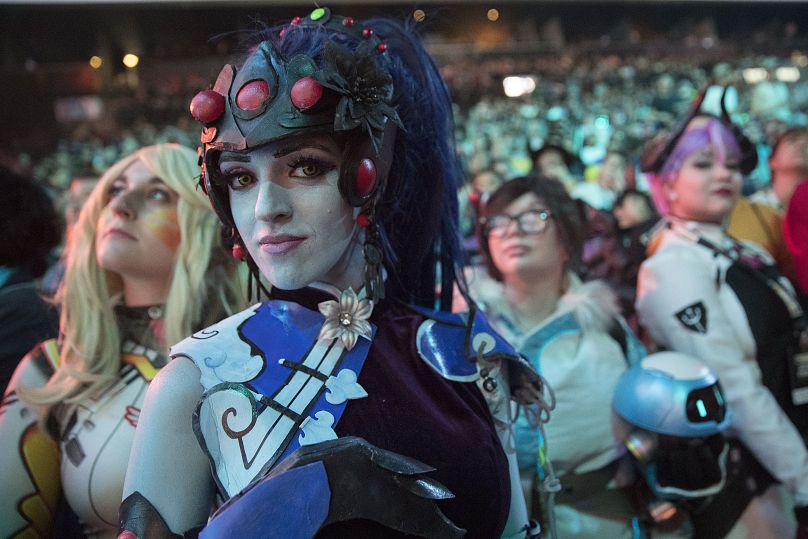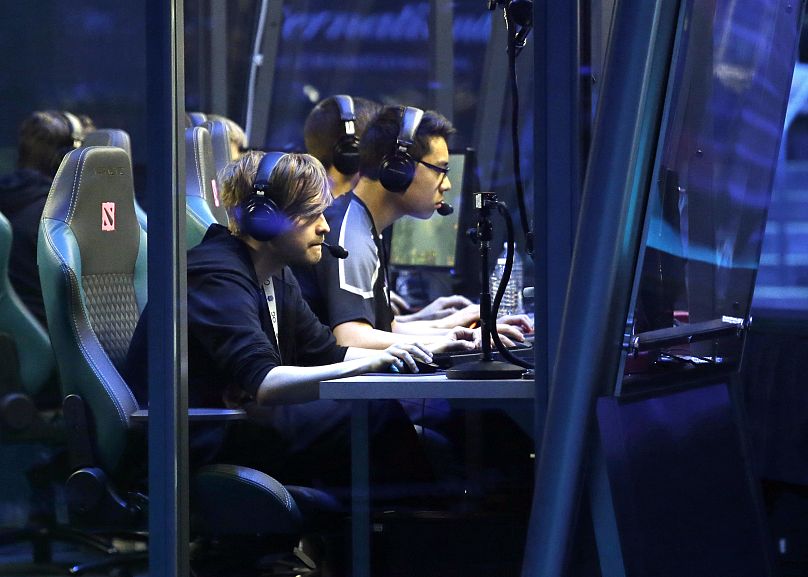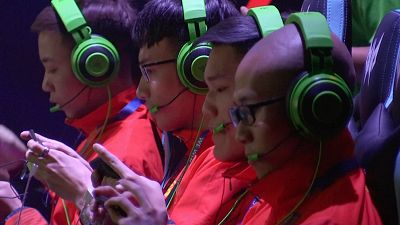Have you slept through the rise of esports? We're here to help you catch up on everything you need to know about the global phenomenon.
Ever since the very first video game was invented, players have been competing against one other to see who’s got the best gaming skills.
But it wasn’t until the 21st century that competitive gaming – better known these days as esports – became one of the most lucrative parts of the video game industry.
Over the past two decades, esports has grown into a multibillion dollar industry, garnering millions of viewers and making dozens of young, professional gamers very wealthy.
This year, competitive gaming is hitting a new milestone on the global stage – the first-ever Olympic Esports Week will take place from 22-25 June in Singapore as part of the Olympic Esports Series 2023, organised by the International Olympic Committee (IOC).
Some of the most talented players in the world will compete in ten different virtual sports, including archery (“Tic Tac Bow”), dance (“Just Dance”), motorsport (“Gran Turismo”), shooting (“Fortnite - Creator Mode”) and tennis (“Tennis Clash”).
But how can a video game be an Olympic sport? And who is paying all of this money to sponsor people who were once dismissed by society as couch potatoes?
If you’re new to the world of esports, we at Euronews Culture have put together a simple, yet comprehensive guide to get you up to speed ahead of the games.
What is esports?
Esports is short for electronic sports. The term was coined in 2000 by South Korea’s Minister of Culture, Sports and Tourism at the founding ceremony for the Korean e-Sports Association (KeSPA).
South Korea is widely recognised as the cradle of competitive gaming because of its high-speed broadband connection and government initiatives to promote gaming culture in the early noughties.
PC Bangs, or gaming cafes, became a mainstay with tech-savvy, young Koreans who paid an hourly fee to play the most popular video games against each other in the same room.
Today, esports is a global affair, with players hailing from every continent and competitions taking place around the world. The term has come to envelop all gaming at a competitive and professional level with an engaged following, similar to traditional sports.
For all the grammar nerds out there, esports is a singular noun when it refers to the industry, a plural noun when it refers to several different esports, and esport can be used when referring to a singular competitive video game (ie, “League of Legends” is an esport).
And no, there’s no hyphen or capitalisation.
Which video games qualify as esports?
Theoretically, any video game can be an esport – as long as it’s possible to compete in it and win prizes, and there’s an audience willing to watch.
Some of the more unlikely esports that have gained a following include a game called Farming Simulator (which is exactly what it sounds like) and Turbo Racing League, a free cell phone game where you race snails.
But the most popular esports fall into several categories: multiplayer online battle arena (MOBA) games, including League of Legends and Dota 2; shooter games, like Call of Duty, Fortnite, Counter-Strike: Global Offensive (CS:GO) and Valorant; fighting games, like Super Smash Bros and Street Fighter; and strategy games, like Starcraft and Warcraft.
The games that really take off are generally promoted by their developers and owners, who will organise competitions and tournaments to get the esports ball rolling.
Unlike traditional sports, there’s always the risk that a game is discontinued, bringing an end to the competitions. That’s what’s currently happening with CS:GO, which is being replaced by Counter-Strike 2.
What’s the appeal of esports?
It’s estimated that there are over 215 million esports enthusiasts worldwide. Major competitions routinely fill stadiums with thousands of fans, who come out to watch the live-action gameplay unfold on giant screens.
The vibe at these events is a lot like traditional sports – fans dress up (sometimes in elaborate cosplay), they wait in line to get autographs from their favourite players, they get emotional when their teams win.
“It’s a lot of emotion, because instead of seeing them behind a screen, seeing them in real life for once is heart-warming, it’s a pleasure,” said Sacha, a fan of France-based esports team Vitality who was attending the CS:GO Majors tournament in Paris this month (the last one before it’s replaced by Counter-Strike 2).
“It makes me feel something, it’s full of emotion, it’s indescribable.”
The crowd went wild when the hometown heroes Vitality took home the top prize in the final for the first time, becoming the second French-based team to win a Major, the equivalent of a tennis Grand Slam for players of the game.
Which esports teams are the best?
The top esports teams can be found all across the globe – from US-based FaZe Clan and Berlin’s G2 Esports, each of which have brought in around $1.7 million (€1.6 million) so far this year, to China’s Tianba and France’s Vitality.
Esports teams operate a lot like football clubs; the team may be based in one country, but their players are generally international. For example, G2’s League of Legends team has players from Slovenia, France, Canada and Denmark.
In multiplayer games, each player will have a position or role to fill, like traditional team sports. Esports players often go by nicknames – for example, Denmark’s Dota 2 star Johan Sundstein, the player with the highest prize earnings this year, goes by “N0tail”.
Are there any women esports players?
Historically, women have been underrepresented in esports, despite the fact that they make up around 45 percent of all video game players.
Reports of sexual harassment and gender discrimination at major developers in recent years forced the industry to implement changes.
One of the most high-profile cases was at US company Riot Games, which developed blockbuster esports games like League of Legends and Valorant. In 2021, the Los Angeles-based developer agreed to pay $100 million (€93 million) to settle a gender discrimination and sexual harassment lawsuit brought forward by female employees at the company, who said they were paid less than men and kept from advancing in their careers.
Today there are conscious efforts by the industry to get more women and girls involved in esports.
Last year, G2 Esports presented its first all-female League of Legends team, its second all-female team. In March, FIFA’s esports branch announced an initiative called FAMEHERGAME to encourage more women to participate.
How is Europe doing in esports?
Europe is the third-largest market for esports after China and North America, with nearly 30 million enthusiasts across the continent. European countries were among the pioneers of the medium, organising some of the first major tournaments and competitions. Some of the most successful players are European, including Finland’s Jess “Jerak” Vainikka and French Sébastien “Ceb” Debs.
In 2003, the first Electronic Sports World Cup (ESWC) was played in Poitiers, France – at the time it was groundbreaking, showing live gameplay in front of a live audience with commentated broadcasts in several languages.
Last year, the European Parliament voted to recognise and support esports across Europe with EU funds. And this June, the Global Esports Federation and the European Olympic Committees will stage the first-ever European Games Esports Championships (#EGE23) in Katowice, Poland.
How much money is in esports?
In 2020, esports generated revenues of $947.1 million (€887.1 million) and recent forecasts predict that figure will grow to as much as $1.87 billion (€1.75 billion) by 2025.
This includes revenue from streaming, media rights and publisher fees, sponsorships, digital revenues and in-game purchases, tickets for events and merchandise.
While it’s still just a fraction of the total revenues generated by the global video games industry, esports have been growing consistently and exponentially in the past years.
The growth is even having positive knock-on effects on the computer hardware and electronics industry, as more people get into gaming and buy specialised equipment and computers.
Where can you watch esports?
If you’ve gotten this far in this article (congratulations), and are thinking you might want to get a taste of the action yourself, you’re in luck because nearly all esports competitions are live streamed online.
In Europe, the most popular streaming platforms for esports are Twitch and YouTube. You can watch top players stream their own gaming sessions at home – some of them, like Tyler “Ninja” Blevins have become celebrities in their own right.
You can also tune in live to competitions and tournaments on organisers’ Twitch or YouTube pages. Many national federations have their own channels – like the European Esports Federation. And competitions for specific esports can be found on the video games’ channels, like Valorant or League of Legends.
